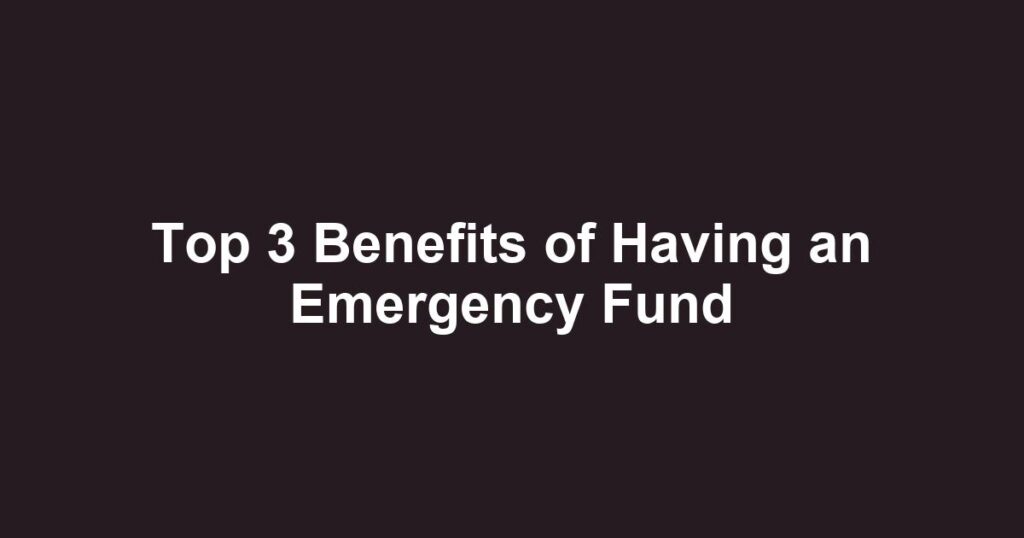Top 3 Benefits of Having an Emergency Fund
In today’s unpredictable world, financial security is more essential than ever. One of the key strategies to achieving this security is establishing an emergency fund. This blog post will delve into the top three benefits of having an emergency fund, highlighting its role in personal finance and the peace of mind it can provide.
What is an Emergency Fund?
An emergency fund is a savings account specifically set aside to cover unexpected expenses that can arise at any time. These can include medical emergencies, car repairs, job loss, or urgent home repairs. Having this fund is a crucial aspect of personal finance management, providing a financial safety net when life throws you a curveball.
1. Provides Financial Security
One of the most significant benefits of an emergency fund is the financial security it offers. Here’s how it can protect you:
- Buffer Against Unforeseen Expenses: Life is full of surprises. An unexpected medical bill can stress your budget significantly. An emergency fund ensures you’re prepared.
- Job Loss Protection: Losing your job can be daunting. An emergency fund can keep you afloat while you search for new employment without falling into debt.
- Avoiding High-Interest Debt: When faced with unexpected costs, many people resort to credit cards. An emergency fund helps you avoid this trap, protecting your financial health.
How Much Should You Save in Your Emergency Fund?
Financial experts often recommend saving at least three to six months’ worth of living expenses. This amount varies based on your personal situation. Consider factors such as:
- Your job stability
- Your monthly expenses
- Any additional sources of income
2. Reduces Financial Stress
Having an emergency fund significantly reduces the anxiety associated with financial uncertainty. Here’s why:
- Peace of Mind: Knowing you have a safety net can allow you to face unexpected situations without panic.
- Improved Decision-Making: When you’re not financially stressed, you can make better decisions. A solid emergency fund allows you to weigh options thoughtfully.
- Less Impact from External Factors: Economic downturns and rising costs can be daunting. With an emergency fund, you can ride these waves more comfortably.
What Are Common Situations That May Require an Emergency Fund?
Understanding the types of emergencies that may arise is crucial. Common situations include:
- Medical emergencies or sudden illnesses
- Job loss or reduced hours
- Major car repairs
- Home repairs, such as a broken appliance or plumbing issues
- Unexpected travel expenses
3. Enhances Your Financial Growth Opportunities
While an emergency fund is primarily about security, it can also open doors to new financial opportunities:
- Invest in Yourself: With financial security, you may consider investing in education or skills training that can enhance your income potential.
- Pursue New Opportunities: Whether it’s starting a side hustle, switching jobs, or moving to a new city, an emergency fund gives you the freedom to take calculated risks.
- Focus on Long-Term Goals: With peace of mind from your emergency fund, you can better focus on savings for your future, retirement, or other long-term financial goals.
How to Build Your Emergency Fund
Creating an emergency fund may seem like a daunting task, but it can be manageable with the right approach. Here are some steps to get started:
- Set a Target Amount: Determine how much you’d like to save based on your living expenses.
- Open a Dedicated Savings Account: Keep your emergency fund separate from your everyday banking to avoid the temptation of dipping into it.
- Automate Your Savings: Set up automatic transfers each month to gradually build your fund without thinking about it.
- Start Small and Increase Gradually: If saving a large amount seems overwhelming, start with a small, manageable goal and gradually increase it as your financial situation improves.
Conclusion
In conclusion, an emergency fund is a cornerstone of financial security, offering immense peace of mind and protection against unexpected events. By providing a buffer for unforeseen expenses, reducing financial stress, and enhancing growth opportunities, an emergency fund is vital to sound personal finance practices. If you haven’t started one yet, now is the perfect time.
Ready to take control of your financial future? Start building your emergency fund today! Even small, consistent contributions can make a significant difference over time. Remember, financial security is within your reach, and having an emergency fund is a powerful step toward achieving it.

